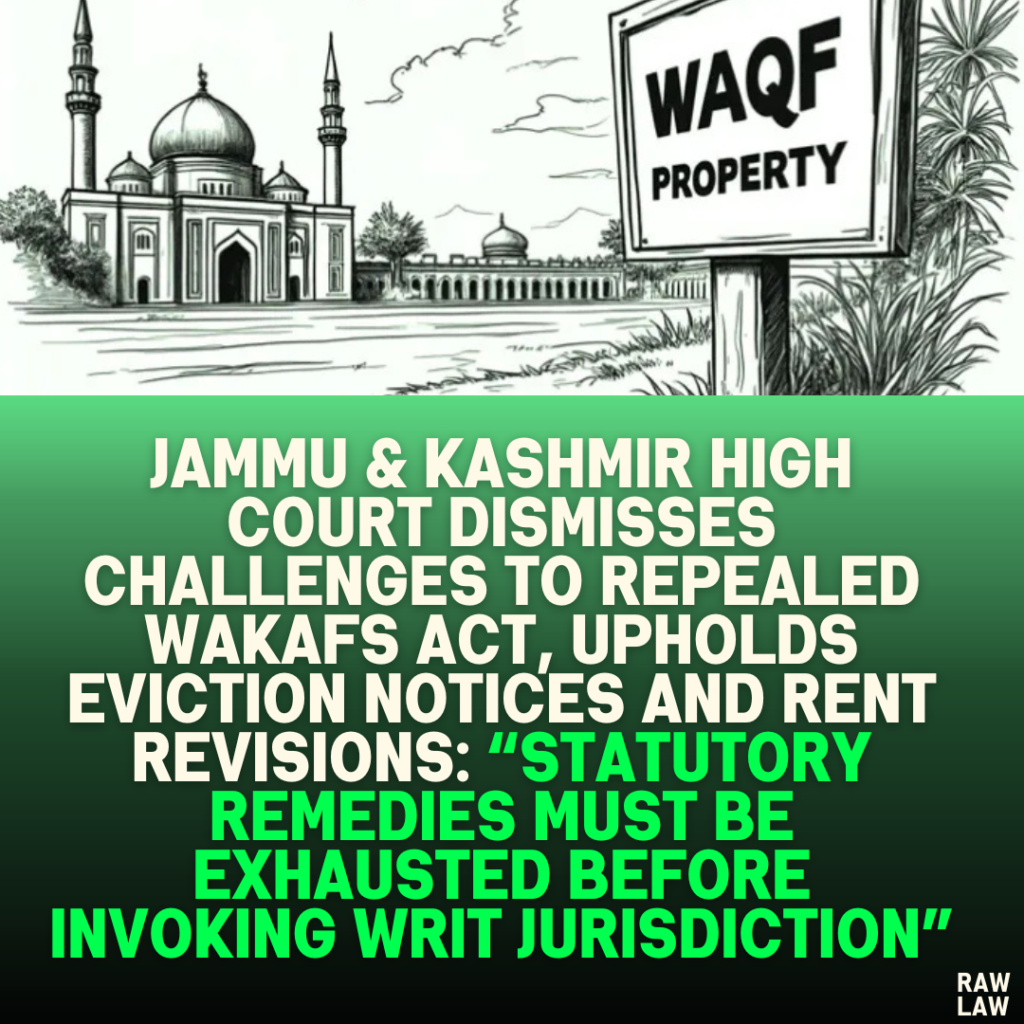Court’s Decision:
The High Court of Jammu & Kashmir dismissed several writ petitions challenging the Jammu & Kashmir Wakafs Act, 2001, and its specific provisions related to eviction and rent revision. The Court held that such challenges became redundant after the Act’s repeal in 2019 under the Jammu & Kashmir Reorganization Act. It directed petitioners to pursue remedies provided under the repealed Act or negotiate with the Wakaf Board for lease renewals on revised terms.
Facts:
- Petitions Filed:
- Petitioners occupied properties managed by the Wakaf Board and filed writ petitions challenging the constitutionality of the J&K Wakafs Act, 2001, or specific sections like Section 45 and Section 46, which authorized eviction notices for non-renewed leases.
- Petitioners also contested rent revisions and eviction notices issued by the Wakaf Board.
- Repeal of the Act:
- The J&K Wakafs Act, 2001, was repealed on October 31, 2019, when the Jammu & Kashmir Reorganization Act extended the Central Wakaf Act, 1995, to the Union Territory of Jammu & Kashmir.
- Actions initiated under the repealed Act, such as eviction notices, were preserved by the Removal of Difficulties Order issued by the Ministry of Home Affairs.
- Petitioners’ Status:
- Many petitioners had occupied properties at prime commercial locations but paid significantly low rents.
- Some leases had expired, while others sought to renegotiate terms under the guise of challenging the provisions of the repealed Act.
Issues:
- Whether petitions challenging the repealed J&K Wakafs Act, 2001, and eviction notices issued under it were maintainable.
- Whether disputes over rent revision and eviction notices could be resolved through statutory remedies or judicial intervention.
Petitioner’s Arguments:
- Challenge to Eviction and Rent Revision:
- Petitioners argued that eviction notices were arbitrary and that rent revisions proposed by the Wakaf Board were excessive and unreasonable.
- They expressed willingness to renew leases at revised but fair rent rates, provided such rates were not determined arbitrarily.
- Questioning Constitutional Validity:
- Some petitions sought to declare the J&K Wakafs Act, 2001, unconstitutional or to quash specific provisions related to eviction notices and rent revisions.
Respondent’s Arguments:
- Justification for Rent Revisions:
- The Wakaf Board argued that rent revisions were necessary as properties were located in prime areas but leased at paltry rates, causing significant financial loss to the Board.
- A Rent Revision Committee had been established to determine fair rents based on the Public Works Department (PWD) schedule and prevailing market rates.
- Eviction Notices:
- The eviction notices were issued only to lessees whose leases had expired or who had failed to renegotiate terms.
- Respondents emphasized they had no intention of evicting petitioners unwillingly but sought compliance with the revised terms.
- Alternate Remedies:
- Respondents contended that statutory remedies, such as appeals under Section 54 of the J&K Wakafs Act, 2001, were available to the petitioners.
Analysis of the Law:
- Effect of Repeal:
- The repeal of the J&K Wakafs Act, 2001, rendered challenges to its provisions academic.
- Under the Removal of Difficulties Order, actions initiated under the repealed Act, such as eviction notices, continued to have legal validity.
- Availability of Alternate Remedies:
- Section 54 of the repealed Act provided for appeals against eviction orders to the State Wakaf Council’s Chairperson.
- The Court reiterated the legal principle that writ petitions are not maintainable when alternate statutory remedies are available.
Precedent Analysis:
The judgment aligned with established principles of law emphasizing:
- The non-maintainability of writ petitions in cases where alternate and efficacious remedies exist.
- The judiciary’s reluctance to interfere prematurely in administrative matters where statutory frameworks provide adequate recourse.
Court’s Reasoning:
- Redundancy of Challenges:
- With the repeal of the J&K Wakafs Act, 2001, the Court noted that challenges to the Act or its provisions served no practical purpose and were dismissed as infructuous.
- Resolution of Rent Disputes:
- The Court acknowledged the petitioners’ willingness to renew leases and directed the Wakaf Board to negotiate revised rents based on fair criteria, ensuring they were not arbitrarily set.
- Proper Forum for Eviction Challenges:
- The Court held that petitioners could not bypass statutory remedies, such as appeals under Section 54, and relegated them to the appropriate authorities.
- Preservation of Rights:
- The Court ensured that petitioners’ right to reply to eviction notices was not impeded by the time spent prosecuting their petitions.
Conclusion:
- All writ petitions challenging the J&K Wakafs Act, 2001, were dismissed.
- Petitioners were granted the liberty to respond to eviction notices or pursue appeals under the statutory framework.
- The Wakaf Board was directed to negotiate revised rents with occupants in good faith.
Implications:
- Legal and Administrative Clarity:
- The judgment clarified the continued enforceability of actions under the repealed Act and the transition to the Central Wakaf Act, 1995.
- Encouragement of Negotiation:
- By directing the parties to negotiate rent disputes, the judgment promoted amicable resolutions rather than prolonged litigation.
- Upholding Statutory Remedies:
- The judgment reinforced the principle that statutory remedies must be exhausted before invoking writ jurisdiction.
